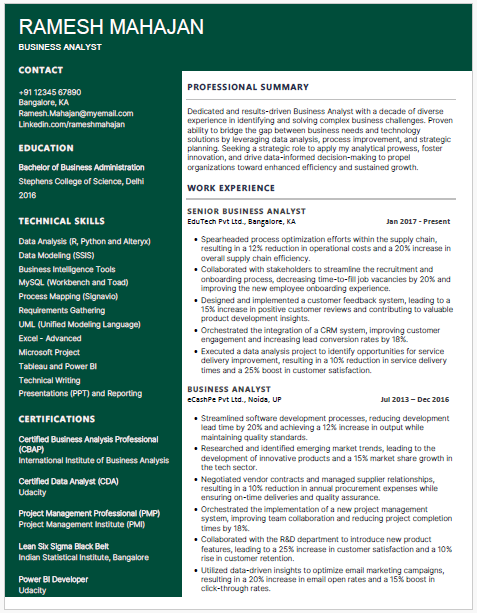Business Analyst
Bachelor of Business Administration

About this template
This is a well-designed resume template which can help you stand out from the competition and showcase your qualifications in a clear, professional manner.
This resume is made by MS Word, featuring a clean and modern layout designed to highlight your skills and achievements. Tailored to your industry, it ensures you stand out to recruiters and make a lasting impression.
Some Useful and Important Technical Skills for BBA Business Analyst
A BBA Business Analyst requires a blend of technical skills to analyze data, improve business processes, and communicate insights effectively. Here are ten important technical skills for a Business Analyst :
1. Data Analysis :
Proficiency in data analysis involves collecting, cleaning, and interpreting data to identify trends, patterns, and insights. Tools like Excel, SQL, and R are commonly used to perform quantitative analysis and generate actionable insights.
2. SQL :
Knowledge of SQL (Structured Query Language) is essential for querying databases to extract and manipulate data. This skill allows Business Analysts to access and analyze large datasets, crucial for making data-driven decisions.
3. Data Visualization :
Skills in data visualization tools such as Tableau, Power BI, or Excel help Business Analysts present complex data in a clear and engaging way. Visual representations like charts and dashboards aid in communicating findings to stakeholders.
4. Business Process Modeling :
Understanding business process modeling techniques, such as creating flowcharts and diagrams, helps map out existing processes and identify areas for improvement. Tools like BPMN or Visio are useful for this purpose.
5. Requirements Gathering :
The ability to gather and document business requirements accurately is crucial. Business Analysts use techniques like interviews, surveys, and workshops to capture stakeholder needs and translate them into actionable project specifications.
6. Project Management :
Familiarity with project management methodologies, such as Agile or Waterfall, enables Business Analysts to coordinate project timelines, resources, and deliverables effectively, ensuring projects are completed on time and within scope.
7. Financial Analysis :
Understanding financial metrics and principles allows Business Analysts to assess the economic impact of proposed changes and make recommendations based on cost-benefit analysis and return on investment (ROI).
8. Statistical Analysis :
Proficiency in statistical methods is important for analyzing data variability, trends, and making predictions. This includes knowledge of regression analysis, hypothesis testing, and probability.
9. Software Proficiency :
Business Analysts often use specialized software for analysis and reporting, such as Microsoft Office Suite (Excel, Word, PowerPoint), JIRA, and CRM systems. Being proficient in these tools enhances productivity and collaboration.
10. Technical Writing :
Strong technical writing skills are essential for creating clear and concise documentation, including business requirements, user manuals, and reports. This ensures that all stakeholders have a common understanding of the project's scope and objectives.
Conclusion :
These technical skills equip Business Analysts with the tools needed to analyze data, streamline business processes, and effectively communicate insights, thereby contributing to the overall success of the organization.